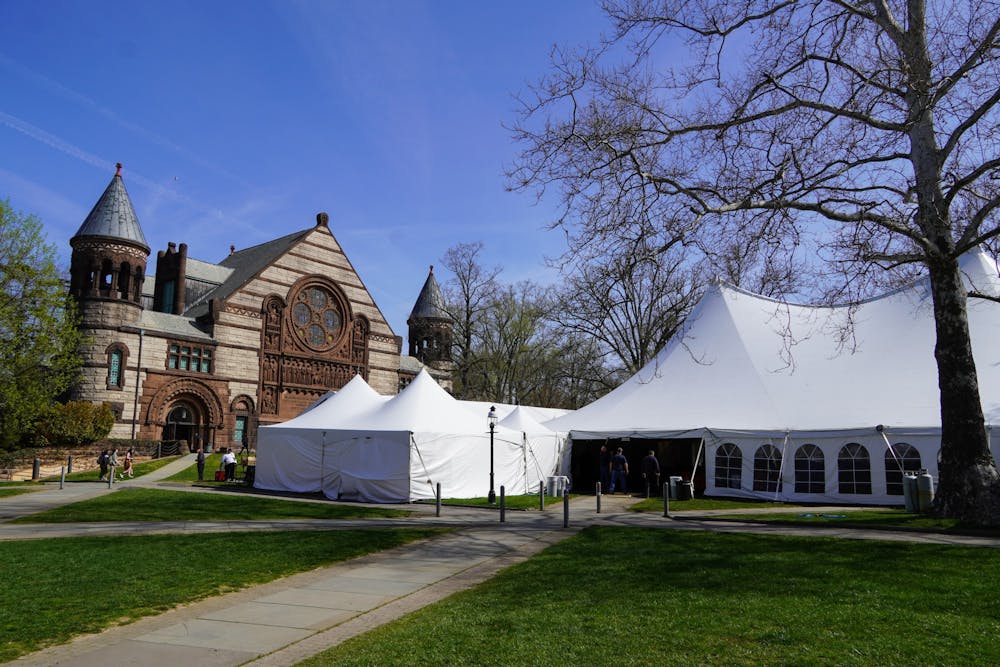On the evening of March 30, the Jupiter Ensemble took the stage of Richardson Auditorium. The music group was led by the outstanding lutenist Thomas Dunford, the group’s founder and artistic director. Additionally, the performance featured talented violinist Louise Ayrton, who proved to be a capable soloist in Vivaldi’s “Winter” concerto; promising cellist Bruno Philippe, who played a vibrant solo; and mezzo-soprano Lea Desandre, a veritable international sensation and Dunford’s longtime collaborator.
The program consisted solely of Vivaldi repertoire. Dunford opened the concert by opposing Igor Stravinsky’s quote, “Vivaldi wrote the same concerto 500 times.” Instead, the Jupiter Ensemble sought to highlight the breadth and variety of Vivaldi’s oeuvre. By juxtaposing loving laments, vengeful musical diatribes, and a moving religious work, the ensemble succeeded in displaying Vivaldi’s diverse music repertoire.
No concert can ever be absolutely perfect, especially when it is the 11th performance of a lengthy tour across the U.S. and Canada. Desandre warmed up audibly throughout the first part of the program: her voice sounded uncharacteristically shallow and lacked power as she navigated the pyrotechnics of her second piece, the incredibly difficult “Armatae face et anguibus.”
Nevertheless, Desandre’s “Cum dederit” was tender, and as she began singing the chilling “Gelido in ogni vena,” a profound change swept across the concert hall. Spectators simultaneously realized that they were privy to something extraordinary. Where previously her low notes had lacked strength, Desandre now explored her range with force and conviction. Her piercing high notes proved even more stunning, filling the hall without sacrificing an ounce of beauty.
The magic continued throughout the following vocal works, particularly in “Gelosia, tu già rendi l’alma mia” and “Onde chiare che sussurrate.” If asked to characterize what makes Desandre’s voice unique, the answer is twofold: her masterful dynamic control and her remarkable precision. Desandre effortlessly sang challenging trills and virtuosic ornaments at pianissimo dynamics, and her seamless crescendos across phrases and unwaveringly long, sustained notes were equally noteworthy. Secondly, Desandre’s vocal clarity is truly admirable. She maintained a vibrato that seemed almost inhumanly narrow and precise in proportion to the volume and projection at which she sang. At a time when wobbly tone is a pervasive pandemic in the world of classical singing, Desandre’s approach is as refreshing as it is lovely.
The audience reacted accordingly: after every single one of Desandre’s later pieces spectators erupted into, at times even standing, ovations and intermittent cries of “Brava.” The unspoken rule of “only clap at the conclusion of song sets” was damned. However, fostering reverential awe was clearly not the ensemble’s goal. Dunford’s amusing introductions and quips between pieces combined with the musicians’ jazzy encore — an original composition brimming with solos — produced a convivial, festive atmosphere. Dunford also took certain entertaining liberties with his pieces. For example, the melody of John Dowland’s “Now, oh Now” was recognizably interpolated as an introduction to the second movement of the elegantly-executed Lute Concerto in D Major. When I later inquired about this choice, Dunford charmingly replied that it was meant as a tribute to his grandmother, a lover of Dowland, who attended the performance.
The past several decades have seen a profound and unexpected resurgence of Baroque vocal music. Arias by Handel, Monteverdi, and their contemporaries are receiving an ever-brighter spotlight. Baroque operas are often celebrated on the stages of Salzburg, Glyndebourne, and the Metropolitan Opera. While gorgeous countertenor voices have received renewed attention amidst this Baroque renaissance, mezzo-sopranos are equally responsible for driving it. The celebrated opera singer Cecilia Bartoli was perhaps the greatest of these pioneers with her CD albums “Opera Proibita” and “Sacrificium” introducing many to the beauty of the Baroque period.
Bartoli is still performing, with her soaring, nimble voice being a regular treat at the Salzburg festival. Joyce DiDonato, another exquisite mezzo-soprano, continues to innovate and enthrall audiences. Yet, an implicit question hovers in the minds of many Baroque music enthusiasts: who will be Bartoli and DiDonato’s spiritual successor, taking up the mantles that they heretofore bore? Up-and-coming sopranos like Jeanine de Bique and Mélissa Petit have charmed critics with their renditions of beloved Baroque arias, but who will be the next great mezzo in this lineage? After Thursday’s concert, Lea Desandre most certainly has my vote.

Andrei Iosifescu is a contributor to The Prospect and can be reached at ai3201@princeton.edu.









